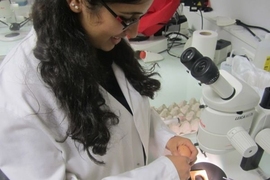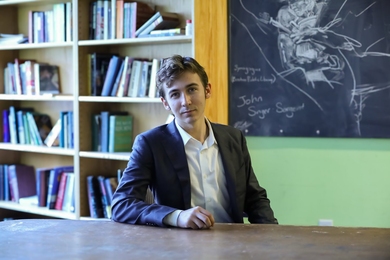At the MIT Global France Seminar on Oct. 27, author Édouard Louis demonstrated to an overflow MIT audience why his writing has become a cause célèbre in France and beyond. During the event, the fourth in this year’s lecture and discussion series, the 25-year-old Louis read from work that simultaneously links the personal to the political and that describes, with brutal candor, growing up poor, gay, and persecuted.
The seminar series, sponsored by the French Initiatives Endowment Fund, was founded by Bruno Perreau, the Cynthia L. Reed Associate Professor of French Studies, who also served as the event's moderator.
Louis introduced his talk in eye-opening fashion.
“If we consider politics to be the governance of human beings by other human beings and the existence of individuals within a community that they didn’t choose, then politics is the distinction between populations where life is supported, promoted, protected, and populations that are exposed to persecution, murder, and death,” he said.
Throughout the evening, Louis drew on vivid and often savage details from his personal history — a trademark of his writing. His first book, "The End of Eddy," is an autobiographical novel describing the flight of Eddy Bellegueule (Louis’ name at birth) from his working-class family and the village of Hallencourt in northern France.
A bestseller in France and translated into dozens of languages, the novel describes what it is like growing up poor, queer, and bookish in a family that struggles to put food on the table, and derides both homosexuality and education. Shamed and physically bullied by family and schoolmates, Louis escaped to university in Paris, where he turned to writing as a way not just of examining the violence he was exposed to growing up, but as a way of understanding the context in which such violence could arise.
Responses to violence
“If you suffer from violence all your life, in the end you inflict it upon others, for example, upon gays, upon what people call ‘strangers,’” Louis has said in interviews.
The kind of unemployment and hardscrabble lives his family and others endured in Hallencourt was a form of violence, he said, perpetrated on this community by an indifferent state. And this violence cascades beyond its immediate victims.
The preoccupation with violence is central to his most recent work: "History of Violence: A Novel," which will appear in English translation in summer 2018. The novel concerns the story of a romantic liaison on Christmas Eve 2012 that goes terribly wrong, leading to Louis’ rape and near-death.
But as Louis explained to his MIT audience, the conventional means of securing justice through the French legal system did not sit right with him.
“Talking about this trauma with the police, they made more suffering and punishment,” said Louis. “They took pictures of my body, humiliating me, stealing my body again, and used these pictures to put somebody in jail.”
Louis also learned that his assaulter had previously served time, and had his own difficult history. “The guy was violent, but I didn’t want him in jail, I didn’t want my body used to inflict hurt and revenge, creating more violence,” he said.
Politics as a matter of life and death
This capacity to transform personal suffering into a meditation on the larger wounds society inflicts on the powerless and marginalized defines Louis’ literary voice. He read excerpts from a new work, a series of vignettes about his relationship to his father, addressed to his father, who lies tethered to a machine to help him breathe — the victim of a factory accident years ago that left him permanently disabled.
“After I ran away, I said I hated you, and felt the need to tell others I detested you. ... You told people in a café you’d have preferred a different son. I felt like I wanted to die. When you drank you said you didn’t understand. You were a victim as much of the violence you dispensed as the violence you endured.’”
Louis described policies enacted by a succession of French leaders that took a terrible toll on his father’s health. For instance, in 2006, then-French President Jacques Chirac raised the cost of medicine his father needed to avoid digestive disorders: “Chirac made you sick to your stomach.” And when President Nicolas Sarkozy decided to reduce welfare benefits to encourage a return to work by the poor, Louis father was forced to accept a job as street sweeper in a city 40 miles away, in spite of his disastrous health.
“Sarkozy broke your back,” said Louis. “Politics is a question of life and death.”
The effects of inequities
During a question-and-answer session with the audience, Louis suggested that the rise of right wing extremism worldwide, often linked to attacks on vulnerable communities, flows from class inequities that leave the working class neglected and powerless.
“The reason why people from my village voted for Le Pen, or people here voted for your president is because there is a lack of representation for the working class,” said Louis.
Confronting structural inequality and violence, Louis concluded, must involve acknowledging the reality of the working class and that their oppression shares a common root with the persecution of gay, immigrant, and racial minorities.
“The world is so full of fiction, with leaders who lie to us, and pretend to help people like my family when they only care about the rich,” he said.
Whether through academic research, writing novels, painting, or demonstrating, he said, “it is urgent, it is necessary to build new spaces to address the question of domination and exclusion.”
Story prepared by MIT SHASS Communications
Writer: Leda Zimmerman








